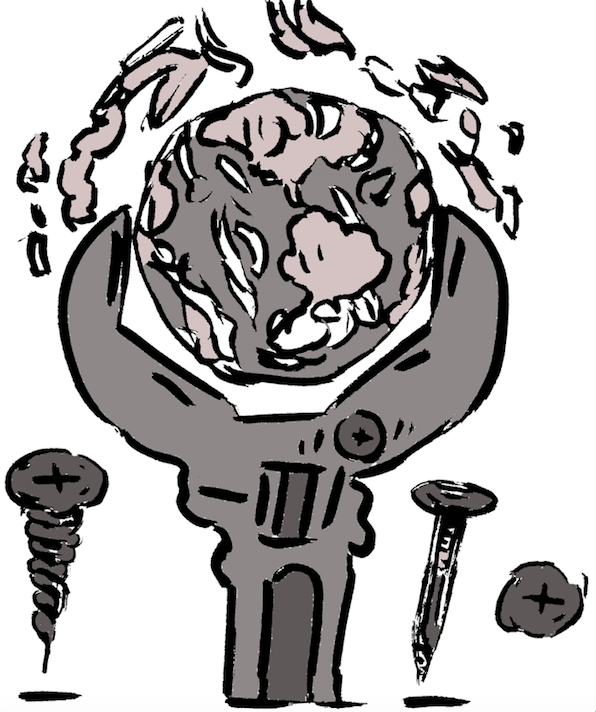Geoengineering and Climate Change
November 2, 2018
Geoengineering is the concept that we can directly use our technology to alter the climate. Instead of our effects on the environment being collaterally harmful, they can be positive, intentionally. Geoengineering is a highly debated hypothetical solution to the anthropogenic climate change problem, involving mostly intensive technological intervention in climate systems to change them for the better. Like most global issues, the adoption of a geoengineering practice relies on many complex considerations.
When evaluating what societal body is responsible for climate change, the conclusion one draws is that developed countries are mostly responsible for the current level of climate change, and that currently developing countries will likely become larger and larger contributors to the problem. The burden of action lies in the hands of those who have already reaped the benefits of societal progression at the cost of the climate.
A central problem in geoengineering regarding climate justice is that those who initiate the actual action of geoengineering will likely not be the ones who suffer the possible cost. Geoengineering costs are more complicated than simply financial; for example, the proposed practice of spraying iron powder into the oceans to fertilize plankton that take in carbon dioxide would result in dead zones, likely damaging a large portion of oceanic ecosystems.

This ecosystem damage would have a dramatic impact on coastal communities, but predicting which areas would be most affected is not yet possible. It is a similar story with most geoengineering practices: side effects are not well known and will likely have no respect for national borders. Those doing the geoengineering are in a position of privilege when it comes to the repercussions too. The variable possibilities are too great to compute, so real-life outcomes are still unknown. The only way to make a fair decision would be to receive input from all those who could be affected. Communication must occur among all people, because any geoengineering action concerns all people. In this way, climate justice calls upon a new level of global citizenship if we, as a race, pursue geoengineering.
There is a paradox present in the practice of geoengineering. Michael Zürn and Stefan Schäfer illuminate this contradiction and a possible solution in their research article,“The Paradox of Climate Engineering.” They state,
“We find a paradox of climate engineering, which consists in the circumstance that exactly those technologies that are capable of acting fast and effectively against rising temperatures at comparatively low costs, are also the technologies that are likely to create the greatest amount of social and political conflict. For geoengineering to occur justly, we must revolutionize the utilization of the tools we have today, both material, and as a global community.”
We have the power use technology to fix the damage that technology itself has inflicted. To geoengineer, though, is to take a massive step in our relationship with the environment. Always before geoengineering our greatest climatic consideration efforts were to minimize the harm our technologies inflict. We have the power to utilize these technologies to help the environment. This is a beautiful statement regarding the capabilities of humankind. Taking responsibility for our actions is a mandatory step in achieving climate justice. Making dramatic changes, and thus amends, is mandatory for taking said responsibility. Geoengineering would be the exact meaning of dramatic change regarding the human-environment interface. Perhaps the scariest possibility would be to fail in our relationship to the environment and realize we didn’t try all we could.






Kat Post • Nov 5, 2018 at 7:04 am
Well said Gavin. Geoengineering will further divide the haves and the have nots. Environmental refugees and political unrest over something untested. I look forward to your opinions.
Andrew Lockley • Nov 3, 2018 at 9:42 pm
Pls link to the study
IDA M HURT • Nov 3, 2018 at 8:52 pm
Hi, Great-Grandson ~ I do believe you’ve inherited what I [and probably no one else] calls the “Anderson writer’s gene”. You’ve no way of knowing this unless someone as old as I and who has been in this family for a long, long time, as I have, knows about this gene. But actually the reason I know, is almost by accident. Let me digress momentarily: I have always been aware that each of MY aunts [your mother’s great aunts, Nellie, Annie, Esther, Jane and Carrie] were all gifted writers, in my estimation. But what I didn’t know until recently was that their mother, my grandmother Annie Anderson, was also a gifted writer. I learned of this because my son-in-law, Walter Hillemann, found some of her writing, addressed to her daughter Nellie, and he sent them to me. When I read her letters, I realized that my grandmother, instead of being illiterate as I had assumed she was. had received enough education to write letters that contained excellent sentence structures and good expressive prose. Of course I don’t really know whether writing skill is an inheritable trait; I’m making assumptions! But knowing you have already begun writing so well after graduating from high school, makes me think [and hope] that inheritance may have been a factor in your obvious ability to express your own ideas so articulately. I’m so glad you are writing so well, Gavin! You will always be able to express yourself in writing. ~ SendingLuv2U, Great-Grandma Ida